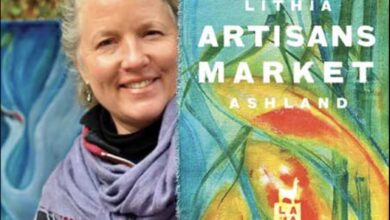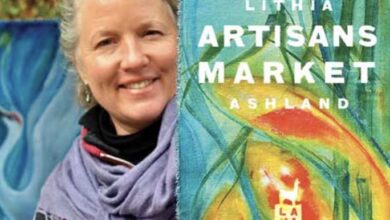Bill Francis – Potter

Bill Francis has been a stalwart member of the artisan community of the Rogue Valley for over a decade. One of the hardest working artists I have ever met, Bill is a pure craftsman, getting as close to the source as possible and always seeking to better himself. An accomplished musician, potter, and a jack of many trades, Bill Francis is a modern day renaissance man.
How long have you been a potter?
Bill… I first started making pottery in 1990. Pottery became my primary source of income about the year 2000.
How long have you been here in Ashland, and why did you choose to settle down here?
Bill… I have been living here continuously since 1999. I chose to stay here because of Ashland’s charm, its social climate, and it’s mild winters. My childhood was spent in Juneau, Alaska, and my adolescence through early adult years in Bend, Oregon. Winters in both locales are chilly. The Rogue valley’s climate provides for a larger variety of outdoor markets, with longer seasons than other areas of our state. The region also has respect and support for local handmade goods.

What did you study at Southern Oregon University, and was that a good experience?
Bill… I was a Business major with a minor in Ceramic Studio Art. I use everything that I learned at SOU on a daily basis. I had some great teachers at SOU. It was a very good experience for me! Majoring in business gave me the tools and confidence to start my own business. I had been working in restaurants for about 15 years, and originally had thoughts of opening my own small restaurant. However, my pottery courses gave me ideas and dreams of a very different lifestyle. I finished school and thought, “I just have to give pottery a chance, I want to see what I can make happen.” I have been running my own pottery business ever since.
As you studied ceramics at SOU, what traditional styles really stirred your desire to go deeper into the medium?
Bill… Ever since Marco Polo returned from China, Western potters have yearned to reach the pinnacles long ago claimed by Asian masters. I was enamored by the great stoneware traditions of Japan, Korea, and China. Sung Tzu Chou ware from China has always wowed me! It is very rigid and perfect in form, contrasted by scratched sgraffito decorations bearing a spontaneous sketch-like nature.
I was introduced to Raku pottery at SOU. It has it’s origins in the Japanese tea ceremony. Red-hot tea bowls are drawn from the kiln, quick-cooled, and promptly used in the ceremony. American Raku is an embellishment on this practice and is intended for aesthetic purposes. I was taught the latter technique by my professor Jim Romberg (Jim’s mentor was Paul Soldner, an artist very instrumental in bringing Raku to the U.S.). Jim is internationally known for his work. It was such an honor to work with him. In his presence came the awareness that the sky is the limit when it comes to ceramics. You can keep it simple or become a rock-star!

I’m impressed with the natural beauty of your pots. Demystify the concept of glazes for us.
Bill… Glaze, pottery, glass, and stones all share the same building blocks — silica and minerals colored by metals. First, think of clay as completely decomposed granite. The firing process turns it back into a stone, hence the term stoneware. Glaze is basically glass with a touch of metal for color. This glass has just enough clay in it to become one with the unfired piece of pottery. So when you fire the pottery you have a stone coated with colored glass.
Working with glazes requires perception. Trial and error experience used in tandem with the minds eye predicts what glazes will look like in finished form.
What do you believe it takes to make a living doing this sort of thing?
Bill… My belief is that a small business has to work on paper and in your heart. This means a person needs to make money, but if sales are down you are still doing what you love. If you can accomplish success in both you are indeed wealthy.
As a business person, every step you take is a leap of faith. Persistence is the name of the game. In hard times I tell myself, “something has got to give, and it’s not gonna be me.”

Compare the experience of selling at the Saturday Growers and Crafters Market on Oak Street to selling at the Lithia Artisans Market on Calle Guanajuato, behind the plaza.
Bill… The Lithia Artisans Market is held along the creek. It is a truly beautiful location, but I don’t believe it is getting the visible exposure or customer attendance that it really needs to remain viable for me. Unfortunately, I sometimes feel it is “out of site and out of mind”.
The Oak street market location is much more visible and physically accessible. You can see it from both Main Street and Lithia Way as you travel through downtown Ashland. The customer traffic is often twice as large as the traffic that I have experienced as an artisan along the creek. I love the Creekside location, but … honestly … my sales are often doubled just a block away.

Please give us your thoughts about the phrase, “Support Local, It Matters!”
Bill… I often see a bumper sticker that reads, “If you bought it, a truck brought it.” I think this idea sucks. What about the jobs that have been outsourced, and all the fossil fuel used to ship those goods. The cost to the environment is huge? Is the trade worth it? How many jobs could be created by making these goods locally.
I believe our society suffers from a disconnect of origins. Where does it come from and where does it go? These are the questions we need to be asking ourselves. Buying local gives you the opportunity to put a face and name with the products and services that you buy. When you buy local you are reacquainted with the origin.
Buying these goods creates jobs. Local businesses take dollars earned and spend locally. Your dollars trickle back throughout the local economy. When you buy local you buy jobs for your neighbors, it’s that simple.

What do you think would be an important step that the City of Ashland could take to help improve the income earning potential of home-based artisan businesses like your own?
Bill… The Lithia Artisan Market is investigating expansion into the plaza. From an artisans perspective, that would be Great! I know the Lithia Artisan Market has been working hard on this idea, and I believe that this vision could be mutually beneficial with positive outcomes for all of the downtown community.
“One more thing to love about Ashland”, is a phrase I often hear from customers at the Oak Street Growers and Crafters market. I think that if the Lithia Artisans Market were in the plaza it would create even more fanfare for the city of Ashland.

You always have your guitar with you when I see you at markets or shows. Tell us about your love of music.
Bill… When people ask me about how I am able to do my art or music I often respond, “that side of my brain just works!” I believe that all of my creative efforts come from the same origin. My love of music is very similar to my love of art. I just chose to make a profession out of pottery. In my world, pottery is what puts food on the table, and music feeds my soul.
Bill Francis Pottery can be found at the Rogue Valley Growers and Crafters Market on Tuesdays and Saturdays, and at the Lithia Artisans Market on Sundays.



